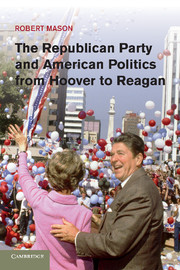Book contents
- Frontmatter
- Contents
- Acknowledgments
- Introduction
- 1 “From Old Home Melodies to Jazz Music”: 1928–1933
- 2 “As Maine Goes, So Goes Vermont”: 1933–1939
- 3 “The Simple Barefoot Wall Street Lawyer”: 1939–1945
- 4 “Liberty versus Socialism”: 1945–1953
- 5 “Modern Republicanism”: 1953–1961
- 6 “A Choice, Not an Echo”: 1960–1968
- 7 “There’s a Realignment Going On”: 1968–1976
- 8 “You Are Witnessing the Great Realignment”: 1977–1989
- Conclusion
- Archival Sources
- Index
- References
6 - “A Choice, Not an Echo”: 1960–1968
Published online by Cambridge University Press: 05 December 2011
- Frontmatter
- Contents
- Acknowledgments
- Introduction
- 1 “From Old Home Melodies to Jazz Music”: 1928–1933
- 2 “As Maine Goes, So Goes Vermont”: 1933–1939
- 3 “The Simple Barefoot Wall Street Lawyer”: 1939–1945
- 4 “Liberty versus Socialism”: 1945–1953
- 5 “Modern Republicanism”: 1953–1961
- 6 “A Choice, Not an Echo”: 1960–1968
- 7 “There’s a Realignment Going On”: 1968–1976
- 8 “You Are Witnessing the Great Realignment”: 1977–1989
- Conclusion
- Archival Sources
- Index
- References
Summary
According to Senator Barry Goldwater of Arizona, Richard Nixon’s defeat to John F. Kennedy – the very narrowness of which fostered intraparty conflict – offered the party a lesson in electoral strategy. “This election outcome does suggest the Republican Party should reexamine its position and should be prepared to reject all those who advocate a ‘me-too’ position for future election contests,” Goldwater argued within days of the defeat. A little over three years later, Goldwater spoke of his alternative to me-too politics when in January 1964 he announced his candidacy for the party’s presidential nomination. “I will offer a choice,” he said, “not an echo.” The strategic argument that an electoral majority existed in support of conservative principles – in support of “a choice, not an echo” – was at the heart of his presidential quest, and it enthused pro-Goldwater activists. The idea alarmed Goldwater’s opponents within the party, who considered the belief in a “hidden” conservative majority not only wrong-headed but dangerous, too; advocacy of such conservatism threatened to reduce the Republican Party to political irrelevance, they thought.
Race informed the strategic disagreement. For Goldwater, it was a matter of electoral reality that his party’s best opportunity for growth was among the South’s white conservatives who still tended to support Democratic candidates. His opponents believed that their cultivation involved a rejection of the party’s fragile Lincolnian inheritance as the proponent of racial progress. Against the background of the tumultuous struggle for civil rights, the Republican Party moved in Goldwater’s direction. The disastrous showing by Goldwater against Lyndon Johnson in fall 1964 confirmed his strategy’s electoral fallacy, and the contest helped to complete the disaffiliation of African Americans from the Republican Party. However, while losing the battle, party conservatives won the war. Although in the shorter-term aftermath of Goldwater’s defeat, conservatism’s future in the Republican Party was unclear, its dominance became clear in time.
- Type
- Chapter
- Information
- The Republican Party and American Politics from Hoover to Reagan , pp. 182 - 215Publisher: Cambridge University PressPrint publication year: 2011



